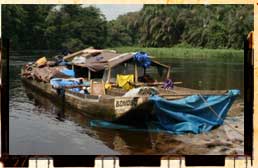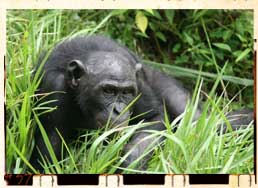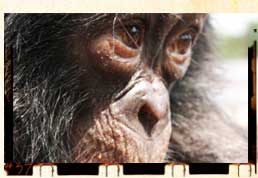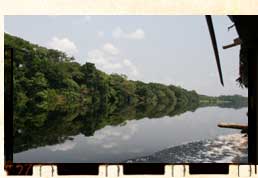Small floating islands formed by a mass of long grass are making their journey downstream. Some of these "grass bergs" are replete with a small tree or two and birdlife, no doubt attracted by the plethora of insects taking refuge on their flight across the wide river. Avoiding their stealthy descent at night is a minefield, and at times we slice headlong into them with a hefty brush of the long grass along the flanks of the pirogues. Le Blanc curses loudly in his native Lingala as he reverses us out and clears the propellers of any weed.
Our meals are cooked on coals placed upon sand towards the bow. Along with our stores of rice and the local staple -- cassava -- we purchase large fish along the way. Goats and chickens from villages also find their way into our cooking pot.
Toiletry matters in such tight confines are not for the prudish. We try to synchronise our bowel movements so that "dropping the kids off at the pool" doesn't involve too many stops. We plunge into the river and take turns, pants dropped, clinging to the stern of the pirogues. Fish here obviously have a ravenous appetite, for I notice my efforts are vigorously devoured -- in thrashing piranha style -- only 5 metres down stream. I just hope they're not the same swimmers that will end up on our dinner plate later that afternoon. The cycle of life should enjoy a more tranquil pace!
Each evening, as the equatorial sun falls perpendicular to the horizon and the last of twilight rapidly fades, the forest yields bursts of fragrances, pockets of sheer olfactory delight. If green had a smell this would be it. We savour the lush foliage in our nostrils, the evening sigh from the verdant depths exhaling after the heat of day. Onward we punt, into the darkness, ever outflanked by the omnipresent cliffs that at times in a side channel allow only a narrowed vault of starry sky. The walls of forest make us feel as if we're journeying down a time tunnel, further and further away from the superficial preoccupations of human affairs to what is primal, magnetic and fresh from the blueprint of life. The cresting wave of trees to our left and right gradually narrows, as if funnelling us back through the ages, drawing us nearer down the eons of time to the bonobos in their rainforest haven -- to a metaphorical dawn of humanity -- and aiming for our disembarking point where the river becomes a 10m wide stream. Wafts of cooking smoke from tiny clearings at times drift over us. We see a few thatched huts, and imagine the family gathered close around their humble fire that flickers like a lantern on the shore. The thought of them in a tight fraternity against the immensity of the jungle pressing from all sides is heart warming.
On the fifth night the moon is surrounded by volcanic eruptions of thundercloud, distant atomic mushrooms sheering into the night and detonating flashes 270 degrees around our vessel. They loom and boom nearer then shy away to do battle on another front.
The constellation of Orion, the great celestial hunter, strides each night above us. As the river meanders tightly back on itself Orion appears to lurch in leaping circling bounds, stalking the left bank one minute, and the right only minutes later. Under his gaze our helmsmen alternate shifts on the bow with hand torches wielded into the darkness like lighthouse spokes, searching for the odd mid-river snag upon which we are in danger of marooning ourselves. At times the presence of a snag is detected by a change in ripples on the river surface, faintly illuminated by the silver dressing of half moonlight.










